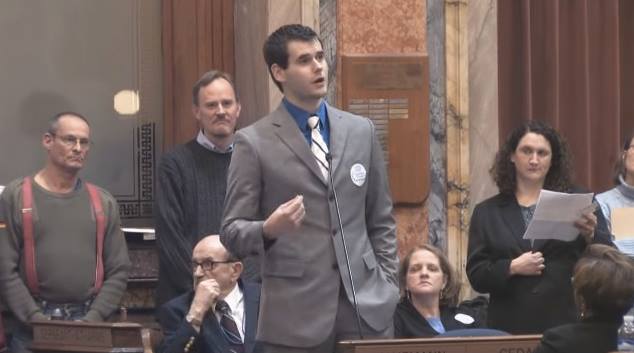Photo of a Ted Cruz supporter’s car spotted in Davenport on January 30; shared with the photographer’s permission.
The final Iowa caucus poll by Selzer & Co. for the Des Moines Register and Bloomberg Politics shows a tight race on the Democratic side and Donald Trump retaking the lead from Ted Cruz among likely Republican caucus-goers. Key findings and excerpts from the Register’s write-ups on the poll are after the jump.
Ann Selzer is “the best pollster in politics,” Clare Malone wrote in a must-read profile for FiveThirtyEight.com this week, which explained Selzer’s methods and “old-school rigor.” One key part of her “A+” methodology is starting from a list of registered voters, rather than using random digit dialing to reach Iowans by phone. Nate Cohn pointed out that Iowa polls drawing respondents from a registered voter list have tended to produce better results for Hillary Clinton, while surveys using random digit dialing have produced the best numbers for Bernie Sanders. Selzer also uses a simpler likely voter/likely caucus-goer screen than many other pollsters.
Bleeding Heartland guest author fladem showed yesterday that the Iowa caucus results have sometimes been noticeably different from the last polls released. Front-runners have often seen their lead shrink, while fast-rising contenders have “come from nowhere.” I am standing by my prediction that the structure of the Iowa Democratic caucuses, where only delegate counts matter, favors Hillary Clinton and will allow her to outperform her poll numbers on Monday night. Speaking of which, there’s still time to enter Bleeding Heartland’s Iowa caucus prediction contest; post a comment with your guesses before 6 pm central time on February 1.
Last spring I was sure Cruz would peak in Iowa too soon and crash before the caucuses. Campaign news from October through December convinced me that I was wrong, and I still believe more in Cruz’s ground game than in Trump’s. However, the Cruz campaign is starting to look desperate, shifting its advertising to attack Marco Rubio instead of Trump, and sending out a deceptive mailer, which implied that Republicans guilty of a “voting violation” could improve their “score” by showing up at the caucuses. I enclose below several links on the controversy and a statement from Iowa Secretary of State Paul Pate denouncing the mail piece, which “misrepresents the role of my office, and worse, misrepresents Iowa election law.”
Pate’s predecessor, Matt Schultz, is chairing Cruz’s Iowa campaign and defended the mailing as “common practice to increase voter turnout.” As Gavin Aronsen discussed at the new website Iowa Informer, it’s rich for onetime “voter fraud” crusader Schultz to be “actively defending a purposefully misleading mailer.” The hypocrisy confirms my view that Schultz and Cruz are a political match made in heaven.
Governor Terry Branstad will introduce Chris Christie at a campaign stop today but won’t officially endorse the New Jersey governor. Several people with close ties to Branstad are active supporters of Christie, who has been stuck at 3 percent in the Register’s polling for months.
Final note: I’m so happy for all the volunteers who are able to knock doors in near-perfect (for January) weather during these last few days of the campaign. Weather conditions leading up to the 2008 caucuses were terrible.
Continue Reading...





